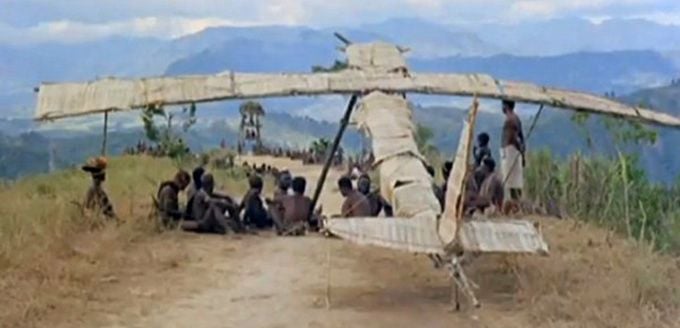John Frum is a mythical figure associated with cargo cults on Vanuatu’s Tanna Island. He is frequently portrayed as a World War II American serviceman who brought wealth and prosperity to the people if they follow him.
A cargo cult is an indigenous millenarian belief system in which adherents perform rituals in the hope that a more technologically advanced society will deliver goods. These cults were first described in Melanesia following contact with allied military forces during WWII.
How Did the Cargo Cult Begin?
The cult centered on John Frum emerged in the late 1930s when Vanuatu was known as the New Hebrides. Though there was a claim in 1949 that it began in the 1910s. Existing religious practice in Tanna’s Sulphur Bay area, particularly the worship of Keraperamun, a god associated with Mount Tukosmera, influenced the movement.
According to one cult analysis, he was first known as John Broom, and followers believed he would one day return from a distant land to sweep away the White colonials and return riches to the islands. To some versions of the story, a native man named Manehivi, who went by the alias John Frum, began appearing among the native people of Tanna dressed in a Western-style coat, promising them houses, clothes, food, and transportation.
Others believe John Frum had a kava-induced spirit vision. He said to be a manifestation of Keraperamun, predicted the beginning of a new era in which all white people, including missionaries, would leave the New Hebrides, leaving behind their goods and property for the native Melanesians. To achieve this, the people of Tanna had to reject all aspects of European society, including money, Western education, Christianity, work on copra plantations, and return to traditional kastom. (Source: Religions)
What are the Cargo Cult’s Causes, Beliefs, and Practices?
Cargo cults share several characteristics, including a myth-dream that is a synthesis of indigenous and foreign elements, the expectation of assistance from the ancestors, charismatic leaders, and, finally, belief in the appearance of an abundance of goods.
Melanesia’s indigenous societies were typically distinguished by a big man political system in which individuals gained prestige through gift exchanges. The more wealth a man was able to distribute, the more people owed him, and the greater his influence upon them.
Those who could not reciprocate were labeled rubbish men. Faced with a seemingly endless supply of goods for exchange as a result of colonialism, indigenous Melanesians experienced value dominance. In other words, they were dominated by others in terms of their value system, and interaction with foreigners made them feel like garbage men. (Source: Scientific American)
What Happened to the Cargo Cult? Are They Still Around Today?
Cargo cults are still alive and well today. Thes cults have just been relocated to Eastern Europe, where people await the magic of The Market and Capitalism to bring them prosperity and transform their lives with as much zeal, and as little understanding of reality, just as the original cargo ship’s islanders. (Source: The Guardian)
